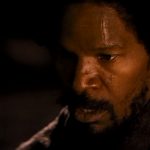Django Unchained – 2012
I liked this movie a lot! It was just really fun to watch. But one of the first questions I have to answer honestly about Django Unchained is, what was it about the film that I liked? What do all of Quinten Tarantino’s films have in common? Excessive violence. When we go to see one of the famous director’s films, we know what we are in for. We expect it, and we aren’t really satisfied if we don’t get it. We love his over-the-top style, the heavily stylized blood and gore, and the almost comical, cartoonish violence.
And this film certainly delivered. But in my experience, Tarantino’s style encompasses two kinds of violence. There is the gratuitous violence, and the serious violence. The movie gave us both kinds. It takes place in the pre-Civil War west and the Antebellum south, and that being said, it is important to note that the film is meant for entertainment, not historical accuracy.
The trick is that the serious violence, the violence that dealt with slavery and the cruelties perpetrated against black slaves by their white oppressors, was accurate enough. At one point a white slave owner allows a runaway slave to be torn apart by rabid dogs. Then later, when Django retaliates and goes on a killing spree at that slave owner’s plantation, the gratuitous, and sometimes comical violence came into play. And yes, I loved it all.
The story begins with the meeting of two men. Django, played by Jamie Foxx, is a slave who is being led through the wilderness. He has been separated from his wife, beaten, and whipped. Dr. King Schultz, played by Christopher Waltz, is a German bounty hunter who dislikes slavery but loves money. He knows that Django would be able to recognize his current target, and so goes out of his way to free Django by killing his slavers.
The two men become instant friends. Schultz teaches Django the bounty hunting trade, and most importantly, teaches him to shoot. The two friends become partners and make a lot of money killing and catching criminals. But eventually, they agree to track town Django’s wife Broomhilda, played by Kerry Washington. She is owned by the sadistic southern gentleman, Calvin J. Candie, played by Leonardo DiCaprio. Candie is into Mandingo fighting, or the practice of entering slaves into death matches against each other.
Our heroes concoct a plan in which they will approach Candie, offering him twelve thousand dollars for one of his best Mandingo fighters, but with the intention of also purchasing Django’s wife. The almost succeed but for two things. The first is Candie’s loyal head house slave, Stephen, played by Samuel L. Jackson, who figures out the plan and tips Candie off. The second is Dr. Schultz’s moral center which drives him to murder Candie rather than shake his hand. You see, after Django and Schiltz’s plot is revealed, Candie chastises them but agrees to simply sell Broomhilda for the twelve thousand dollars. Everything would have been fine if Schultz would have only shaken his hand to seal the deal. But after seeing how cruelly Candie treated his slaves, he murders him instead, after which he is instantly killed, himself. Then the bloodbath begins. Django kills white man after white man before being captured, giving himself up to save his wife’s life.
But he quickly escapes and returns to the plantation to get his woman. He gets the drop on the few survivors and kills them all in cold blood. He kills Stephen, and in a comical turn, he shoots Candie’s innocent sister. When the bullet hits her, she flies backward as if she’s been tied to a runaway train. Then he proceeds to blow the mansion up. Never-mind the fact that the dynamite was in a single area of the house, but the spectacular explosion came from every area of the building.
As for the stand-out member of the cast, I have to recognize Christopher Waltz. He was great, creating a character with style, personality, panache, humor, and a fair amount of pathos. I haven’t seen him in many films, but he always seems to turn in a fantastic performance. Foxx was alright but his character was a little one-note. He simply played a modern-day gangster in an old west setting. True, it happened to work for this movie, but Waltz was just better.
As with all of Tarantino’s films, the music plays an important part. He has an uncanny knack for choosing the perfect pieces of music to fit any scene. In fact, very little music was actually written for the film. Other musical selections, in this case, mostly from between 1966 and 1974 were used.
In fact, the entire film was Tarantino’s homage to the Spaghetti Western genre, based on the 1966 Italian Spaghetti Western film which was just called Django. It is interesting to note that the man who played the title role in that film, Franco Nero, had a bit part in Django Unchained. Other notable actors like Tom Wopat of The Dukes of Hazard fame, and Don Johnson from Miami Vice, also had cameo roles. It is also fun to note that the title, Django Unchained, is an homage to both the 1959 film Hercules Unchained, and the 1970 movie, Angel Unchained.








